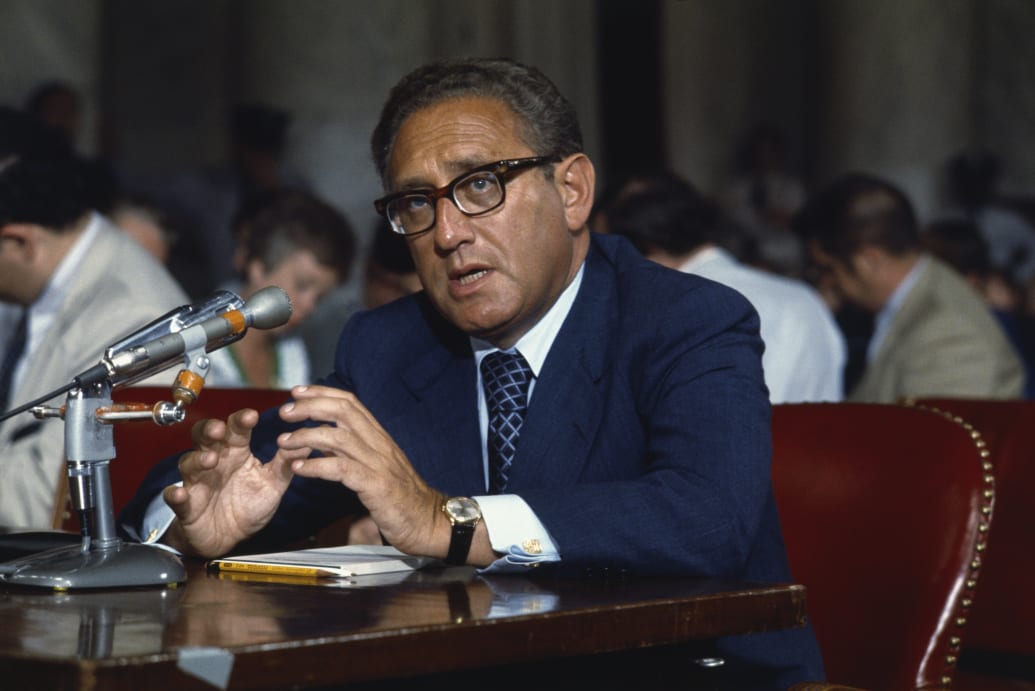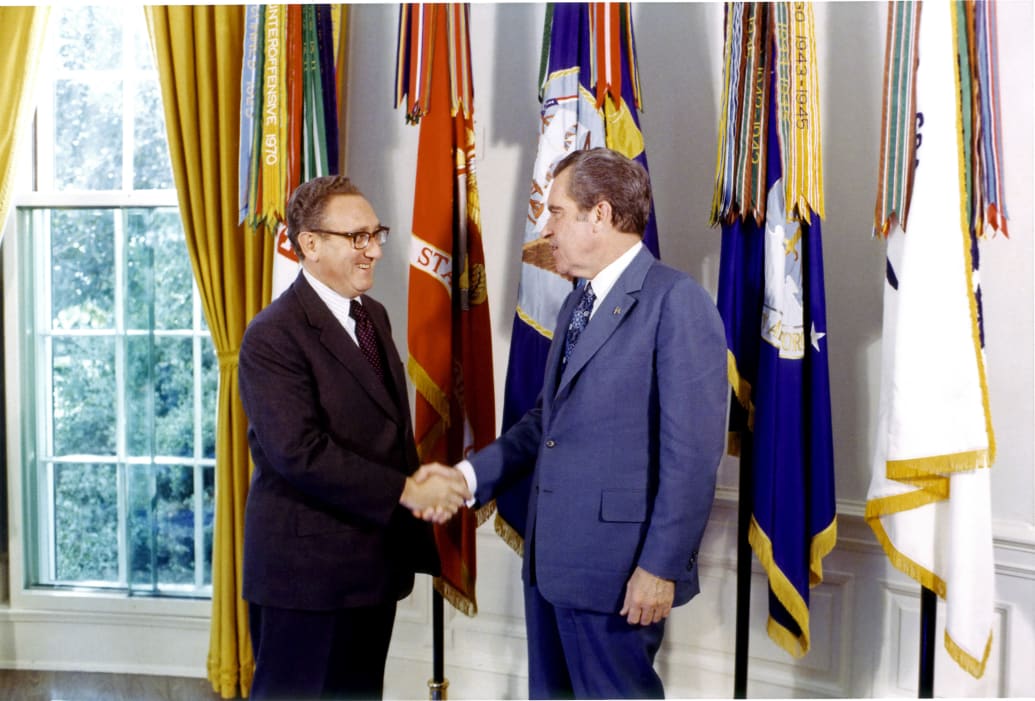Henry Kissinger’s ‘Celebrity’ Could Only Happen in America
Kissinger #Kissinger

Henry Kissinger was the celebrity statesman of the century in which he lived.
That was his doing as much as it was the consequence of the media age in which he lived. He was his own greatest creation. For all his seriousness as a scholar and diplomat, despite the horrific consequences of many of his acts while in power, because of and in spite of those things, Kissinger became a foreign policy icon and an oracle, the ur-soundbite sought for any story about just about anything weighty and geopolitical.
That is a remarkable accomplishment for a Jewish refugee from Hitler’s Germany. It eclipses the success he achieved at Harvard or in government or afterwards as a businessman. It colors all that with stories infused with his personality. He was not the first diplomat to fly between world capitals seeking diplomatic agreements, but when he did it it became something different, “shuttle diplomacy,” as akin to a sporting event in the eyes of the public as it was to previous efforts by any of his predecessors or contemporaries.
He was known to the average American as much for dating a movie star, Jill St. John, or hobnobbing with the world’s social elites, or the German accent that never left him as he was for any professional accomplishment.
None of this was an accident. Kissinger cultivated his public persona. He recognized that it brought him a kind of continued relevance that few other public officials had ever achieved after they had left office.
Appearing before the Senate Foreign Relations Committee 9/7 on his nomination to be Secretary of State, Henry Kissinger pledged to cooperate closely with Congress in conducting foreign policy for a durable peace.
Getty
Kissinger entered the government as national security advisor to Richard Nixon in 1969. He departed, after just over three years as secretary of state, in 1977. He was extraordinarily influential during that period engineering Middle East peace negotiations, helping to usher in the reopening of U.S. relations with China, shaping the policy of détente between the U.S. and the Soviet Union, and pursuing (albeit circuitously) an end to the Vietnam war. He became the only person to hold the jobs of national security advisor and secretary of state simultaneously.
It was also during this period that Kissinger ruthlessly pursued policies that history has rightfully come to condemn—the horrific secret bombing of Cambodia that claimed hundreds of thousands of lives, giving the green light to slaughter in East Timor, encouraging coups and brutality in Latin America.
By the time he left office he was seen as more powerful than any previous foreign policy advisor had been. Many saw him as having grown too powerful—including the second president he served, Gerald Ford, who once told me during an interview for my history of the National Security Council, Running the World, “The most important thing I did was make Henry give up being National Security Advisor. He had too much power.”
But in some respects what was most remarkable about Kissinger was that he left office in 1977 and he remained the most influential figure in U.S. foreign policy for the remaining half-century after that. As I noted in Running the World, written in 2005, in a section called “Two Degrees of Henry Kissinger,” almost every national security advisor since he served had either worked directly for Kissinger or had worked for someone who had worked directly for Kissinger.
He maintained that role, even as serial revelations about the toll of some of his most brutal policies had led millions around the world to view him as a war criminal. He was cognizant of that fact and wrote hundreds of articles and almost three dozen books, and conducted hundreds upon hundreds of interviews in part to try to reclaim or shape the narrative about him.
But there were other benefits. They helped promote his consulting business (where I worked for two years in the late 1990s). They helped promote his stature among elites and kept him on the short list of gray heads that virtually every U.S. president turned to for advice. And they helped promote the idea that Kissinger was the foremost foreign policy thinker of our time.
Then- Secretary of State and National Security Advisor Henry Kissinger and President Richard Nixon as they shake hands in the Oval Office.
White House / Getty
His campaign to remain relevant was aided no doubt by his voracious appetite for learning, a desire to stay current that brought him into regular contact with world leaders and kept his thoughts evolving. (One of his most recent books was The Age of AI, co-written with former Google CEO Eric Schmidt.) It was also helped by the fact that Kissinger, who could be very difficult with his staff, was capable of warmth and wit—especially while on camera or in front of an audience.
In the end, while his prodigious intellectual output must be acknowledged, it is also fair to say that it could not overshadow the deaths of millions for which he deserved at least a share of the blame.
Further, it created a mistaken impression about Kissinger’s place within the foreign policy community. He was not the most successful secretary of state of the modern era. (That would probably be James Baker and may yet be Antony Blinken.) He was not the best among America’s national security advisors. (That was certainly Brent Scowcroft, although it must be also added that Jake Sullivan, the current NSA, is doing an exceptional job.) He was not even the greatest strategic mind to hold those jobs. (I think that honor goes to Zbigniew Brzezinski.)
He was exceptionally important. But others did the jobs he held better than he did, almost all with less controversy and carnage. He made some really significant contributions—the opening to China and then working throughout his career to help keep that relationship on an even keel was, in my view, by the far the most important of these. But there was less positive to his legacy than he sought so hard for so long to define and there were massive blemishes that even a half a century of the most extraordinary communications effort we have ever seen from a public figure could not erase.
In the end it was a uniquely American story—as only the story of an immigrant who achieved great heights of success in this country could be. Indeed, for all his effort at shaping a unique persona, what Kissinger in the end represented was a character that is not uncommon in our history: That of a senior government official or public figure whose path to fame and fortune was achieved via hard work, brilliance, calculation, sharp elbows, currying favor among the more powerful and in exchange providing them with what they needed—including from time to time ruthlessness—to advance themselves and their allies even further.
For all that is unique about Kissinger, what we must ponder most carefully as we contemplate the role that he played, is that how America conducted itself during his time in office was hardly the only time in history that the leaders of this country (like those of most other nations) saw the death and suffering of millions as essential to our advancement as a nation…and that somehow despite his involvement in yet another such chapter, we found it possible to celebrate him nonetheless.

